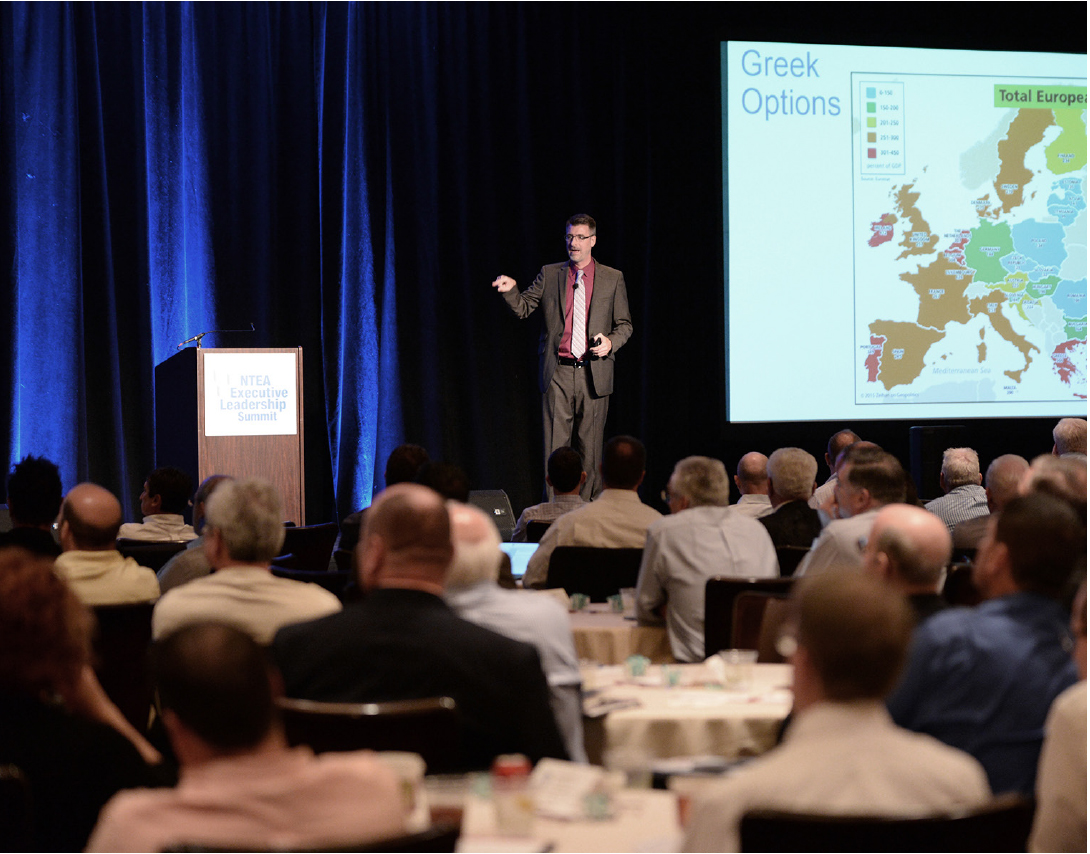Guest editorial
Peter Zeihan
President and Founder
Zeihan on Geopolitics
This article was published in the July 2019 edition of NTEA News.
After weeks of seemingly positive leaks out of ongoing American-Chinese trade talks, at the stroke of midnight May 10, the Trump administration nearly tripled the level of preexisting tariffs on Chinese exports to the U.S. market. Officials made it clear the action was punishment for Chinese attempts to renege on earlier points of agreement, with even bigger increases now in the pipe.

This approach to trade negotiations is eminently sustainable.
It comes down to three factors.
First, cost.
The U.S. has more millionaires than the number of citizens in Sweden, and in the past couple decades, has spent sums on issues as disconnected as wars and new entitlements which exceed the gross domestic product of all the world’s countries, China included. To think the addition of a few dozen billion in tariffs will break the back of America’s $12ish trillion consumer market is simply bad math.
Second, perspective.
The Americans most likely to feel price increases on the mass manufacture products subject to the new duties happen to be the slice of the U.S. political class most likely to grant Trump the benefit of the doubt. After all, they see themselves as the people most put upon by prior Chinese mercantilism. For Trump, even if a single job doesn’t return to the U.S. as a result of expanded tariffs, there simply isn’t any political downside.
But just because the U.S. can afford a trade war and Trump perceives no political danger isn’t the same thing as saying the U.S. can win one. This brings us to the third angle: Leverage.
To be perfectly blunt, China has almost none.
The U.S. utterly controls the market the Chinese must keep accessible. China exports over four times as many goods to the American market as vice-versa. China has already run out of goods to slap on retributive tariffs. All new tariffs, from this point forward, will be excruciatingly painful for Chinese players.
The Chinese economy remains heavily dependent upon imports of value-added manufacturing products to make its more mid- and low-tech industries function. The relative dependency upon such external support is an order of magnitude higher than that of the NAFTA-centric American system or Germany’s more diversified supply network. Without such tech, there isn’t much of a Chinese manufacturing system.
Most importantly, the imbalance in American security commitments is shifting from the best the Chinese could have ever hoped to the worst-case scenario.

Peter Zeihan speaks at NTEA’s 2016 Executive Leadership Summit.
Before the Second World War, the fractured nature of the Chinese geography made it a playground for external players as diverse as Japan, Britain, France, Germany — even Australia. But after the war, the American imposition of a global order rooted in free trade ejected the imperial powers from China, while also enabling China to trade with the wider world on peaceable terms for the first time. Put simply, America’s creation of the global order combined with the Nixon and Carter administrations’ efforts to integrate China into this order are what made the Chinese rise possible.
China cannot fly solo. The U.S. utterly controls the strategic environment which enables the Chinese to import raw materials and energy while exporting finished goods. Much has been made of China’s rapidly growing navy, but most scuttlebutt misses the point: Fewer than 10% of China’s ships can operate more than 1,000 miles from shore. Middle Eastern energy and American consumers are five times this distance. Europe is double that again. Only the American Navy can guarantee the safety of Chinese trade.
But, Americans are done. They have been backing away from their global commitments ever since the Berlin Wall fell. The pace of withdrawal is accelerating. One solid point of agreement in the fury of American domestic politics is the U.S. must take a less involved position in global affairs. Anything that weakens American commitment to the global order threatens Chinese success.
If Beijing’s end goal involves any flavor of energy or market access, or any hope of technological improvement or economic coherence, it must keep Americans involved. That leaves Beijing one simple, maddening play: Give in.
Learn more about the Executive Leadership Summit lineup and register at ntea.com/executivesummit.